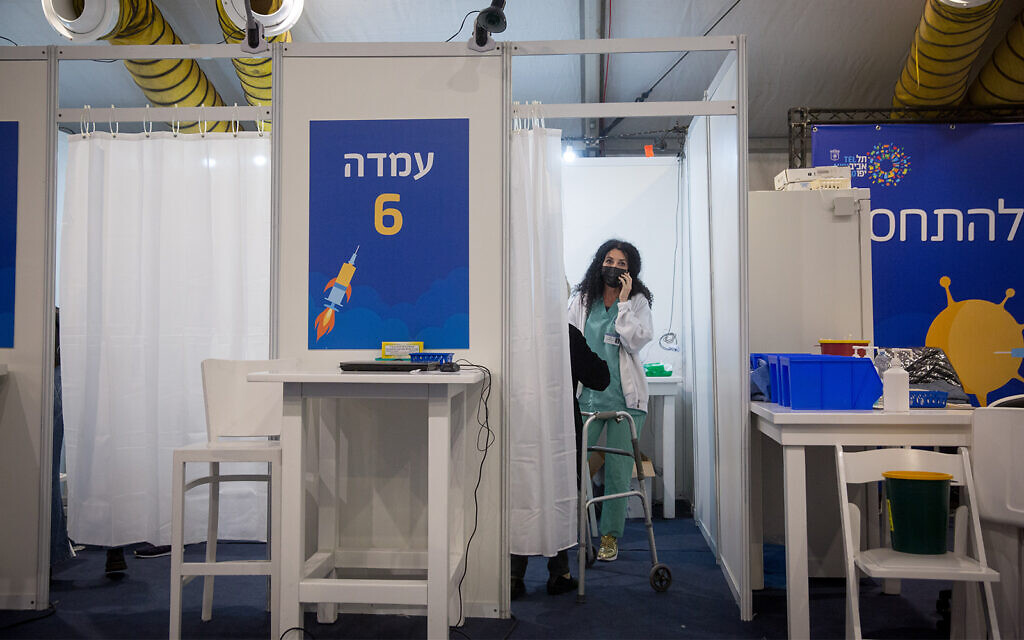The Ministry of Health advised pregnant women to get the coronavirus vaccine on Tuesday after several pregnant women became seriously ill with COVID-19, raising concerns.
“There is no evidence of damage from vaccination throughout the pregnancy,” said the Ministry of Health in a note that also included an alert.
“In pregnant women who were infected and became ill with the coronavirus, there is a higher incidence of severe onset of the disease than in a population of similar age,” said the ministry.
Get the daily edition of The Times of Israel by email and never miss our top news.
Pregnant women who decide to be vaccinated can do so through their health maintenance organization, the ministry said.
Ten pregnant women have been seriously ill and hospitalized in the past few days due to coronavirus infections, according to Hebrew media reports.
Their babies were born prematurely through cesarean sections because of the life-threatening risks for mothers and children, the reports said.
Some of the women are suspected of being infected with the so-called British coronavirus strain, a mutated strain that is believed to be more infectious, although it is not considered to be more deadly.
Due to the incidence of serious illnesses in pregnant women, the Director General of the Ministry of Health, Chezy Levy, consulted the National Council for Women’s Diseases and Fertility and an official committee that decides on prioritizing vaccinations.
The priority committee gave its approval to pregnant women of all ages to receive the vaccine that until now was only available to medical workers, over 45 and at-risk groups.
The committee recommended vaccines for pregnant women regularly exposed to the public or with health problems, while other pregnant women can decide for themselves what to do based on the recommendations of the Ministry of Health.

An Israeli man receives a COVID-19 vaccine at a vaccination center operated by Tel Aviv Municipality with Tel Aviv Sourasky Medical Center (Ichilov), in Rabin Square in Tel Aviv, January 19, 2021. (Miriam Alster / Flash90)
In Tuesday’s statement, the Ministry of Health pointed out that experts estimated that “there is no biological mechanism that explains the possibility of damage to the mother or fetus”.
The ministry added that women who were vaccinated without knowing they were pregnant had no more irregular developments during pregnancy than those who were not vaccinated.
The clinical trials for the Pfizer-BioNTech vaccine that Israel is using in its mass vaccination campaign did not include pregnant or lactating women and the companies said there was not enough data to show whether there is any risk involved.
This has led authorities in some countries to exclude pregnant women and breastfeeding mothers from their vaccination programs, including in Israel.
After the ten pregnant women were recently hospitalized with the virus – four last week – the Ministry of Health ordered them all to be tested to see if they were infected with the British strain, or another mutation detected in South Africa, the public Kan issuing reported Tuesday.
The samples were sent to the central laboratory of the Ministry of Health and initial results show that at least three of them have the British strain, reported the website Ynet. The final results will be available in the coming days.
Health officials said there is no evidence so far that standard coronavirus vaccination will not work with the British strain as well, but there is concern that its arrival in the country is increasing infection rates, even with the vaccination program booming. . Monitoring groups estimate that Israel has by far the highest number of vaccinations per capita in the world.

Prime Minister Benjamin Netanyahu, center, and Health Minister Yuli Edelstein, seen as the second millionth citizen to receive the coronavirus vaccine, receives the injection in Ramla on January 14, 2021. (Tomer Neuberg / Flash90 )
On Tuesday, Health Minister Yuli Edelstein said more than 186,000 people had received injections the day before, most of them second shots for those who had already taken the first, as well as tens of thousands who were receiving the first injection.
According to ministry data, as of Tuesday, 2,215,963 people have received their first dose, almost a quarter of Israel’s nine million inhabitants. The number includes 479,818 who also had the second.
Despite the fast pace of the vaccination program and the national blockade in place for three weeks, the ministry said that on Monday there were 10,051 new cases diagnosed, the highest number of daily cases since the outbreak began early last year.
A total of 565,629 people in Israel have been diagnosed with the coronavirus since the beginning of the pandemic and there are 82,652 active patients. The death toll reached 4,080.
